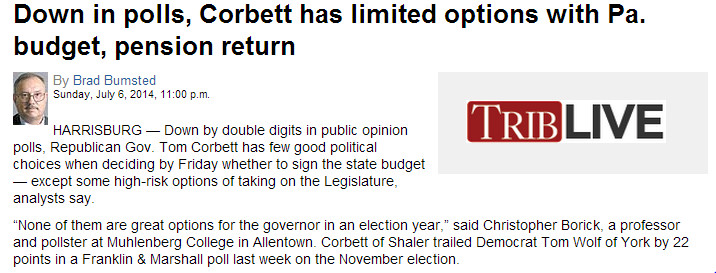PA HB 2328: 2014-15 Budget General Fund
Within the budget (PA HB 2328) the governor is providing an increase in education funding.
FOR IMMEDIATE RELEASE: February 04, 2014
Governor Corbett’s Budget Increases Funding for Education by $387 Million; New Initiatives to Raise Student AchievementI decided to take a look at this increase and how it will be distributed. One might conjecture how the Governor would allocate an increase in education dollars.
- Would he reward school districts that are doing well? doing poorly?
- Would he give more money to the most needy districts (poverty?)
- Would he give the additional funds in an equitable fashion (all districts get the same % increase?)
- Would he give the additional funds based on educational need?
- Or would he give the additional funds based on political expediency (fall election this year?)
Here is the plan for Allegheny County School Districts. This table contains the state allocations for each district, the dollar ($) and per cent (%) increase from last year's budget, and the district's 2013 poverty statistics based on federal lunch eligibility. The districts are rank ordered from largest to smallest increase. Above the green line is an increase greater than 6% and below the red line is an increase less than 3%.
When I looked at this chart I was shocked. The schools that received the lowest increase were the poorest schools. I assumed this couldn't be true. So I did an analysis looking at the correlation between the % increase in the district allocations and % poverty by district. Here is what I found.
The line of best fit suggests a strong correlation between poverty and budget allocation (R^2=.59). The only problem is that the correlation is an inverse correlation - the more poverty a district has, the less additional money they receive. Although all of the districts are represented in the graph, four are listed by name. Looking at two districts exemplifies the overall correlation. Quaker Valley is receiving an 8.2% increase with 15.7% poverty. Clairton is receiving a 2.7% increase with 90.8% poverty.
This is the state we live in. The haves get more money, the have-nots are vilified for low test scores. I cannot imagine what the thinking was that determined these allocations. Can you?
So are they making these allocations based on trying to obtain votes for the current administration? With a Republican majority in the state legislature and a Republican Governor behind in the polls, that is one logical conclusion.
There is a second, meaner conclusion. We are living in a time where sympathy for those less fortunate has gone by the wayside. If you are poor, a minority or unemployed, you are perceived as being lazy, dependent on government handouts and costly to our society. We live in a state that refuses to expand Medicare to people without health insurance, that refuses to tax the very wealthy natural gas industry (fracking), that uses its lottery proceeds for the elderly and not for education, that has no desire to expand Pre-K education, that legalized gambling with none of the proceeds going to education. We live in a state where the two largest state universities (Pitt and Penn State) have the highest tuition for in-state students in America. We live in a state that is mean spirited.
In 2004, the state of Pennsylvania officially changed its state slogan to "The State of Independence". True enough. We are independent in PA. You are on your own to get health insurance... you are on your own to get a quality education... you are on your own if you don't have a job... you are on your own if you are a child born into a poor family in a poor community, you are independent.




I have been asked by a number of followers of this blog to provide a mechanism for comment and dialogue. The goal of The Principal's Office is to create a new language - data driven, successful models and new ways of thinking - for talking about public education. I am opening the blog up to comments for the purpose of engaging people who are passionate about finding successful models of education for all students no matter their income, race, neighborhood or family situation. Comments will be moderated to ensure that contributors are adding to our knowledge base. I look forward to your input.
ReplyDeleteRick I so appreciate what you are doing with this blog. I read it avidly and forward it to many of my colleagues still in PPS. Thank you
ReplyDeleteA kick-ass article that takes its strength from the anger vibrating out behind the truth it tells. We should all be angry. Our state is leading the way in hard-core bullshittery in education funding, environmental policies,
ReplyDelete